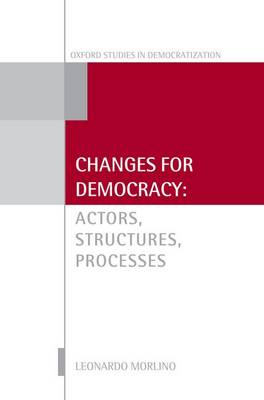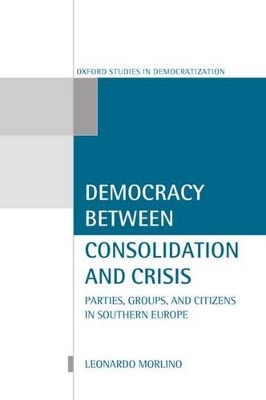Oxford Studies in Democratization
2 total works
In this major new work, based on an unprecedented range of empirical and theoretical reflection, the author presents a broad-ranging and far-reaching analysis of the mechanisms and processes of democratization. Having reviewed the main theoretical positions in the literature, he goes on to discuss the key features required of a new definition of democracy and to highlight and discuss the existence of a new type of regime: the hybrid regime. The second and third parts of the book cover three geopolitical areas (Southern Europe, Eastern Europe, and Latin America) and examine the main issues in the process of democratization across each area, including the transition toward democracy, installation, consolidation and crisis. From this analysis a new, more nuanced theoretical position is developed and presented. The analysis provides the richest reflection yet on one of the most important political processes of the modern times. The book will be essential reading for all scholars and students of democratization. Oxford Studies in Democratization is a series for scholars and students of comparative politics and related disciplines.
Volumes concentrate on the comparative study of the democratization process that accompanied the decline and termination of the cold war. The geographical focus of the series is primarily Latin America, the Caribbean, Southern and Eastern Europe, and relevant experiences in Africa and Asia. The series editor is Laurence Whitehead, Official Fellow, Nuffield College, University of Oxford.
Volumes concentrate on the comparative study of the democratization process that accompanied the decline and termination of the cold war. The geographical focus of the series is primarily Latin America, the Caribbean, Southern and Eastern Europe, and relevant experiences in Africa and Asia. The series editor is Laurence Whitehead, Official Fellow, Nuffield College, University of Oxford.
The second half of the twentieth century has witnessed several waves of democratization in Europe, the Americas, and in other regions of the world, such as South East Asia. Although for the most part these democratic regimes are no longer haunted by the prospect of a return to authoritarianism, severe economic and social problems have posed serious challenges, creating a situation where change is often achieved through alternating periods of consolidation and crisis.
Drawing on a systematic, empirical analysis of four key Southern European countries, Portugal, Spain, Greece, and Italy, Morlino identifies several key aspects of democratic consolidation: consensus and legitimation, party system and party organization, and the ways in which organized and non-organized interests are related to parties and the institutions of state. The resulting models of consolidation are analysed and the mechanisms and patterns of their unfolding crises identified, taking
care to disentangle the pragmatic reactions against the regime, often related to corruption, from more ideological ones grounded in differences in values. Finally, the author addresses the question of the `quality' of democracy, examining how this is related to the outcome of processes of
consolidation and crisis.
This insightful study offers the first extensive, comparative analysis of consolidation and crisis in these countries, and features a wealth of up-to-date information on party organizations, interest associations, the media, and public opinion. Although clearly focusing on Southern Europe, the author's findings are extremely relevant for understanding the politics of several other regions, including Eastern Europe, Latin America, and South East Asia.
Drawing on a systematic, empirical analysis of four key Southern European countries, Portugal, Spain, Greece, and Italy, Morlino identifies several key aspects of democratic consolidation: consensus and legitimation, party system and party organization, and the ways in which organized and non-organized interests are related to parties and the institutions of state. The resulting models of consolidation are analysed and the mechanisms and patterns of their unfolding crises identified, taking
care to disentangle the pragmatic reactions against the regime, often related to corruption, from more ideological ones grounded in differences in values. Finally, the author addresses the question of the `quality' of democracy, examining how this is related to the outcome of processes of
consolidation and crisis.
This insightful study offers the first extensive, comparative analysis of consolidation and crisis in these countries, and features a wealth of up-to-date information on party organizations, interest associations, the media, and public opinion. Although clearly focusing on Southern Europe, the author's findings are extremely relevant for understanding the politics of several other regions, including Eastern Europe, Latin America, and South East Asia.

